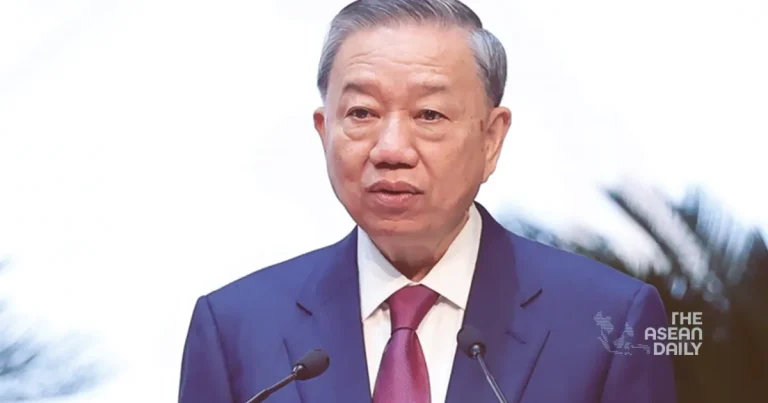27-8-2024 (HANOI) Vietnam’s political landscape is undergoing significant changes as the country’s newly appointed Communist Party chief, To Lam, prepares to step down from his role as president later this year. This development comes as part of a broader government reshuffle following the death of his predecessor and amid an ongoing anti-corruption campaign that has led to unprecedented political upheaval.
The National Assembly, Vietnam’s legislative body, has accepted the resignation of Deputy Prime Minister Le Minh Khai for violating anti-corruption rules. In a series of moves aimed at stabilising the government, parliament has also appointed three new deputy prime ministers.

These changes, revealed in various government statements, are seen as an attempt to create a sense of stability ahead of the Communist Party’s crucial twice-a-decade congress scheduled for early 2026. This congress is pivotal in determining the country’s top leadership for the subsequent five-year term.
Le Dang Doanh, an economist and former government adviser in Hanoi, commented on the situation: “The reshuffle will help things settle down, especially with To Lam leaving the presidency. The party leadership is strategically matching officials with positions to ensure smooth governance and prepare for the upcoming Party Congress.”
The National Assembly is set to vote in October on a candidate to fill the presidency, according to Bui Van Cuong, the legislature’s Chief Administrator. Under Vietnam’s political system, the Party Central Committee will nominate a presidential candidate for parliamentary approval.
By limiting Lam’s role to that of party chief – considered the most powerful political position in Vietnam – the country is reverting to its traditional “four pillars” structure. This system typically sees separate leaders holding key governmental positions, a departure from the recent past where some leaders held multiple top roles simultaneously.
Carl Thayer, emeritus professor at the University of New South Wales in Australia, noted the significance of this move: “To Lam’s decision to relinquish the presidency quells potential questions about Vietnam’s stability and direction. The government will now return to having four distinct individuals at the helm of leadership, rather than three.”
The death of long-time Communist Party General Secretary Nguyen Phu Trong in July added a layer of uncertainty to the government’s operations. This came at a time when a years-long anti-corruption campaign had already led to the detention of numerous senior officials and business executives. In recent months, two presidents, three deputy prime ministers, and other party officials have resigned from their positions.
The resignation of Deputy Prime Minister Khai, who oversaw economic affairs, is particularly noteworthy. Khai had been at the forefront of economic diplomacy, having recently urged US Treasury Secretary Janet Yellen to grant Vietnam market economy status. His departure is linked to violations associated with an investigation into a resort-residential project.
As part of the reshuffle, three new deputy prime ministers have been appointed: Minister of Foreign Affairs Bui Thanh Son, Finance Minister Ho Duc Phoc, and Nguyen Hoa Binh, who was previously dismissed from his position as chief justice of the Supreme People’s Court of Vietnam. Son and Phoc will retain their ministerial roles until parliament selects their successors.

To Lam, who officially assumed leadership of the party on 3 August, has pledged to “resolutely” continue the aggressive anti-corruption push while working to ease bureaucratic bottlenecks to boost the economy. This campaign, dubbed the “blazing furnace” by his predecessor, remains popular among Vietnamese citizens, many of whom express admiration for Lam on social media.
Giang Nguyen, a visiting senior fellow with the ISEAS-Yusof Ishak Institute in Singapore, highlighted the campaign’s impact: “Vietnam’s anti-corruption drive has helped improve its ranking in Transparency International’s corruption perceptions index, moving from 113th in 2016 to 83rd last year.”
However, the relentless investigations have also slowed governmental processes, with some Vietnamese business people expressing concerns about paralysis within certain government sectors due to fears of being caught up in anti-corruption probes.
The ongoing political changes have also created uncertainty among foreign investors. Some observers view the anti-corruption campaign as a means to remove political rivals amidst behind-the-scenes power struggles. This has led to anxiety that the crackdowns could result in a less friendly attitude towards foreign investors, reminiscent of the “socialist-inspired nationalism” seen in China under Xi Jinping.




